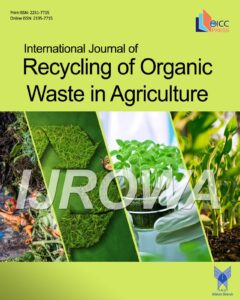Cotton spinning waste as useful compost for organic Indian Spinach (Basella alba ) production in Bangladesh
Authors
Abstract
Purpose This study aims to ascertain the physiochemical characteristics of the compost made from recycled cotton spinning waste (CSW) for Indian Spinach cultivation in Bangladesh.
Method The physiochemical characteristics of the compost made of fresh cotton spinning waste (CSW), cotton spinning waste ash (CSWA), rice husk (RH), rice husk ash (RHA) with varying ratios following open air composting method was determined. The utility of the resulting compost was justified by applying it to Indian Spinach cultivation compared with chemical fertilizer and control (no-compost) treatments.
Results Among the several composting options, the compost prepared by mixing 87% CSW + 13% CSW ash (C3) and 87% CSW + 13% rice husk (C4) was found to be the quality compost with a higher C/N ratio, P, K, S and a lower Pb content. The vegetative growth, yield and nutritional qualities were significantly affected by the compost characteristics compared to chemical fertilizer because of increased nutrient uptake and biostimulation functions. Moreover, Indian Spinach cultivated with CSW compost provided 64 BDTk. profits compared to 28 BDTk. in case of control that indicates 128% increase in profit for the compost than that of control.
Conclusion The compost derived from the mixture of CSW+CSWA+RH+RHA substrates possesses an optimum moisture content (31.2%), pH (7.5), C/N ratio (16.8:1), macronutrients, and micronutrients that enable it to act as an alternative to chemical fertilizer. When it comes to yield and nutrition quality of the grown Indian Spinach, CSW based compost fared much better than chemical fertilizer in field test.
Highlights
- Cotton spinning waste (CSW) derived compost turn out to be a sustainable recycling for agricultural application rather than posing environmental and health hazards.
- CSW exhibits characteristics of organic supplements that can be used as a substrate in composting.
- CSW based compost provides a low-cost and safe crop production option with adequate essential plant nutrients and lower level of heavy metals compared to chemical fertilizer.



